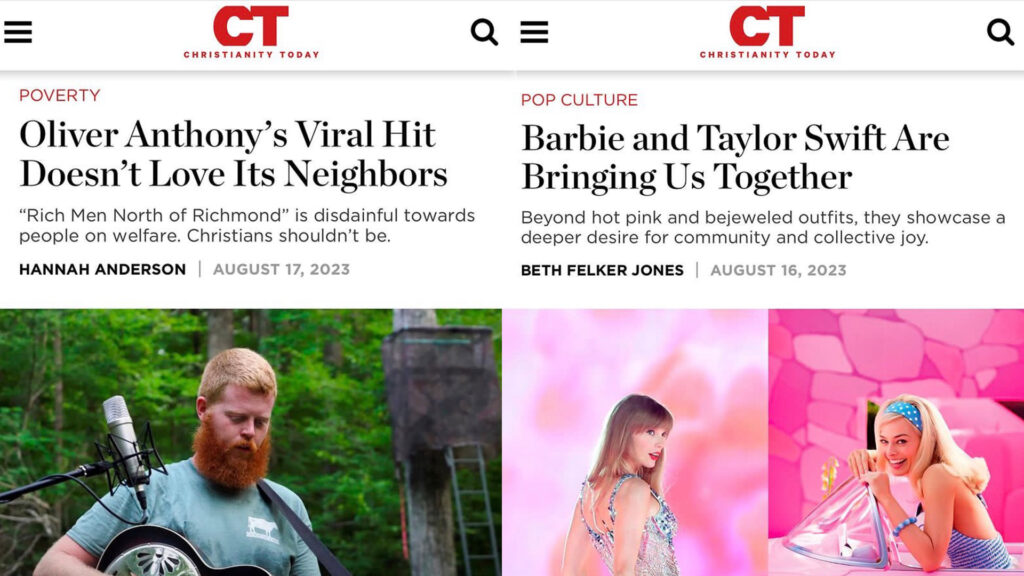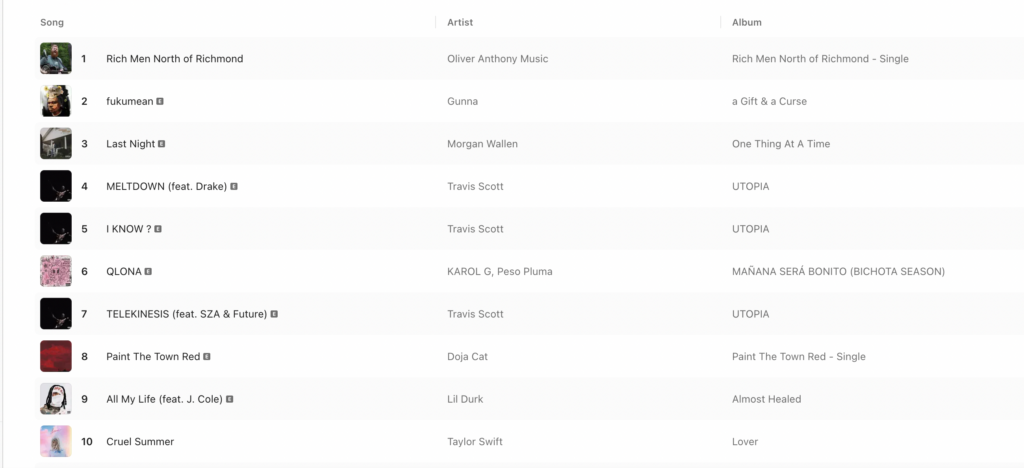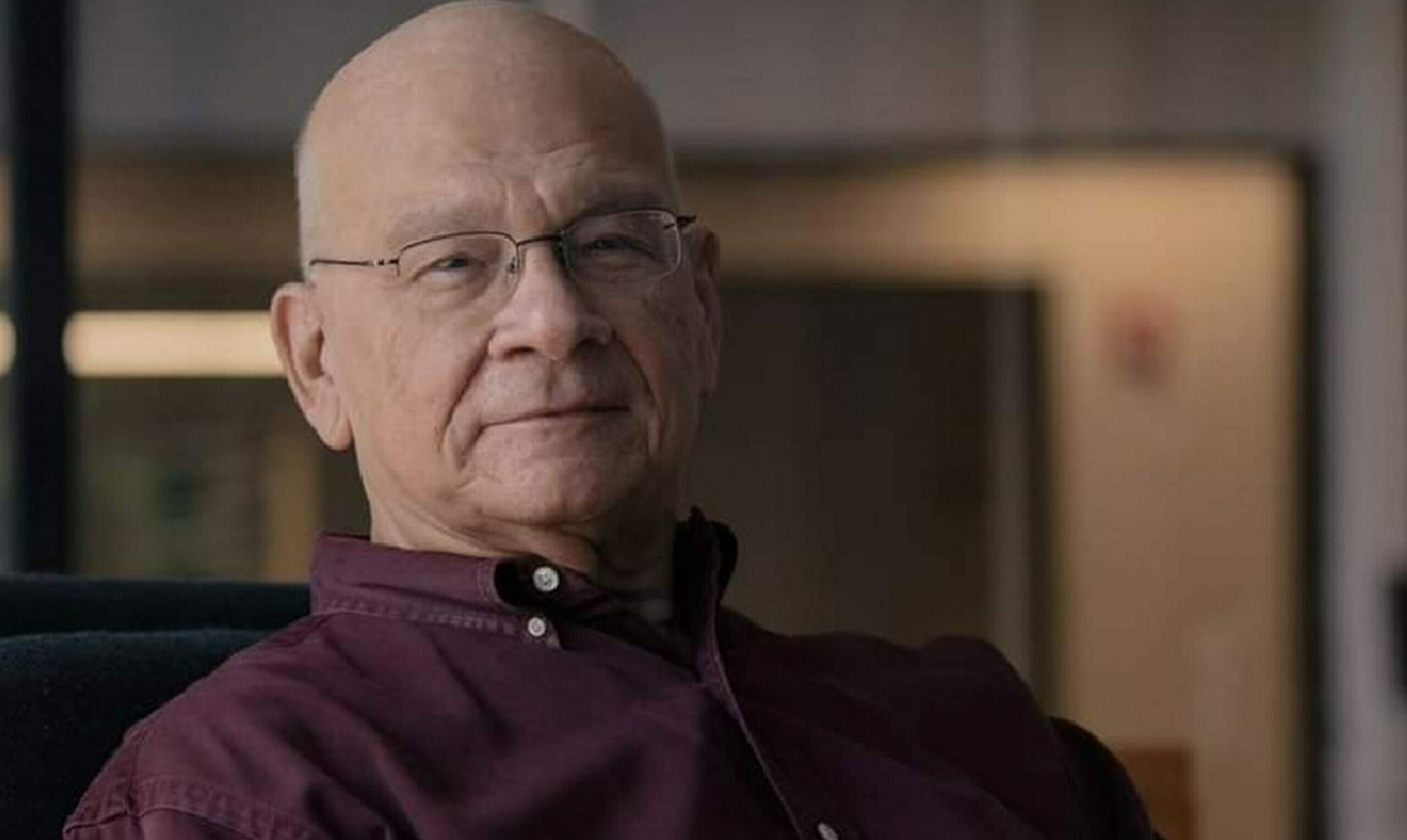This week, Christianity Today published an article entitled “Barbie and Taylor Swift Are Bringing Us Together.” The author described how the epic trifecta of Barbie, Beyonce, and Taylor Swift have thematically marked the summer of 2023 as a “Tween Girl Summer.” They note it as a cultural moment in which women are allowed to have fun all while “helping women reclaim girlhood without rescinding power.”
Many may remember this summer as a party of pink, but to draw such singular conclusions is to miss how many other Americans will likely remember it instead. For all the thirty-something moms carpooling in diamonds to sing their hearts out on another night with Taylor, many other stadiums worth of people will be remembering the much different words of Oliver Anthony’s “Rich Men North of Richmond.” Many will remember the summer of 2023 for the Bud Lights they didn’t drink, the government finally admitting there are UFOs, and that now famous line about politicians and minors. Some may call it the summer of pink, but it’s time we talked about blue-collar men.
In addition to their celebration of the way in which Barbie has brought us together and reinforced the “spending power of women,” Christianity Today also released a story on the current Apple Music number one hit—it isn’t by Taylor. The CT article charges in its headline, “Oliver Anthony’s Viral Hit Doesn’t Love Its Neighbor.”

Before wading into this debate, I’m supposed to demonstrate my own blue-collar resume. Should I mention I was born in a small Ozarks town? How about being pretty good with clays and a shotgun? Or I could mention that my dad was a cop. How about my brother being in the marine corps? I have a cousin that’s a professional rodeo announcer.
Fine. To be honest, I don’t qualify for blue-collar status, though many nights you will find me with a guitar trying to convince my daughter to sing along to George Strait. Still, I’m a pastor; strike one. I’m finishing up a doctoral degree; strike two. I don’t even drink; I’ve never had a Bud Light.; strike three—or, actually, that might be a vote in my favor this summer. I have, however, spent much time talking to men over the last few years. Since writing The 5 Masculine Instincts, it’s a topic I’m often asked about and have spent much time discussing. I’d like to offer some thoughts for Christianity Today and the rest of us trying to better understand this moment:
The Point of Oliver Anthony’s Song
The CT author was primarily concerned with Anthony’s joke about those who are obese and on welfare. Point taken. Certainly not a joke I would make, nor am I here for its defense, but to call out that one line is really to miss the song’s point, its (for those paying attention not so) surprising cultural resonance, and the joke itself.
What Anthony is seeking to articulate is the current feeling of many working-class men in this nation—the whole system is stacked against them. Inflation, shifting job markets, and rapidly changing cultural/political correctness has left many overwhelmed, discouraged, and feeling left behind. There are plenty of stats to back up the complaints. Men are dropping out of the workforce, education, marriage, fatherhood, and church participation. Men are more addicted to substances, more prone to isolation and depression, and leading in suicide.
But really, what I think is resonating with Anthony’s song is his willingness to say what many feel they are no longer allowed to. Just search for Anthony’s song, and most articles describe it as “controversial,” “dangerous,” “extreme.” To be fair, I’d suggest you work through the lyrics of the other current top ten songs on Apple. I’ll let you judge our current definition of extreme and controversial. The screenshot is below, so I don’t have to type some of those titles…

As a culture, we have long afforded a large degree of generosity to those voices which seek to articulate the pain and frustration of the oppressed. It’s the explanation every time a protest turns destructive. We’re told this happens when people feel they have no other voice. You might hate everything Oliver Anthony believes and says, but haven’t we said it is our Christian conviction to listen to those who feel like their voices are being drowned out by those in power? Do they have to share your political perspectives to earn your hearing? How much grace are we willing to extend to hear what they have to say?
Suppose you extend Anthony even the smallest benefit of the doubt, even if just momentarily, to try and understand his perspective and why the song has resonated with so many. In that case, I think it’s evident that his intention isn’t to mock the poor on welfare. He is attempting to describe how broken our American systems have become. We have built a society that cripples the working class with the debts of our bureaucracy. We do trap people in systems of welfare. And it’s long been noted that those on Government assistance do face an increased risk of obesity and other increased health risks, partly because inflation has made whole foods out of reach for even many not on welfare. The point of the song is that everything is broken, and no one is allowed to say it. Many working-class men feel like they can no longer provide for their own families, and yet those in power continue to not only gain wealth but dole it out as a political tool for power. Anthony didn’t write a song to mock people on welfare. He wrote a song to try and point out how broken everything feels. He wrote a song to suggest that this new world isn’t working. That is what resonated.
Let me extend CT the same benefit of the doubt. They’re right, the joke about obesity is not Christlike nor loving of a neighbor, but I might also argue that Anthony’s articulation of the pain many working-class men are facing could be a way of showing love for his neighbors. I think he wrote the song to try and give voice to what few were willing to acknowledge. We’ve long been told that giving voice to pain is a form of loving ones neightbor. It’s that ability to hear and understand what men are saying I worry the church has abandoned.
Why Are the Lost Always on the Left
I was trained for pastoral ministry in a cultural moment where we worked tirelessly to make the Christian witness winsome and relevant to the shifting culture. I understood the logic. Culture flows from the urban centers, which produce the arts and education. If we wanted to impact the culture, we needed to influence tomorrow’s cultural influencers, producers, and thinkers. These cultural influencers were increasingly liberal, so we assumed that the great theological questions of our day would be those raised by the East and West Coast elites. We were wrong, and it is having a lasting effect.
First, the church misunderstood the fragmenting effect of the internet. There is no one American culture. There is not even one left and one right American culture. The internet has produced far more “cultures” than can be counted. The traditional cultural centers of New York and L.A. have fragmented into new centers of influence located in online forums, YouTube channels, and social streams. No longer is there a cultural elite that functions as the gatekeeper for access to the American mainstream. Today, any blogger in a basement can publish and gather a devoted following. How else could a Virginia Farmer overnight rise to the top of every music chart with a self-produced acoustic song?
By imagining that we can reach our nation with the gospel by cultivating a winsome witness to Hollywood only demonstrates that we’re living two decades in the past. That world no longer exists. If we want to share the gospel with neighbors, it’s going to take reaching into some subcultures no one would call elite. We’re going to have to take the gospel to where people are, and increasingly that’s not evening primetime on the major networks.
But there is a second mistake we’ve made. Not only have we continued to over-value the significance of the past generation’s cultural institutions, but we’ve mistakenly assumed that all the lost are over with them on the left. The church is constantly asked by writers and publications like Christianity Today to think more winsomely about our witness to the left. (I hate using the language of left and right for reasons I just made, but bear with me.) We are asked to consider how our words and actions, our rhetoric and affiliations might be a barrier to someone of differing political opinion, by which is always meant the left.
I’m not suggesting such considerations are wrong. I’m simply asking are we willing to offer the same considerations to the lost on the right. Do we recognize such people exist? Is it possible that in our hunger for cultural acceptance and approval, we’ve neglected to care for those on our right? Many of our Christian leaders recoil at anything that smells Trumpian or Maga or too right-wing. I’m not asking you to adopt their politics, but do they not deserve the same Christian charity, generosity, hospitality, and “winsomeness” we offer the elites on the left? Who gets the benefit of the doubt, Taylor Swift or Oliver Anthony? Who gets celebrated? Who gets the time and attention of our most nuanced witness?
Micro Aggressions
The last decade has taught us to read into the most subtle suggestions of bias. We have been well warned of any micro-aggression, which might lead to inequality, even if in the most subtle forms. We’ve been told that Christians should be the first to embrace the dispossessed: bind the wounds of the hurting and lift the heads of those downcast. Can we recognize it when it’s a blue-collar white man who feels like the world is staked against him? I worry Christianity Today no longer recognizes its lost neighbor on the right. I’d like to see them devote as much time and attention to respecting and presenting the gospel to those lost blue-collar men as they do the brokers of cultural interest on the left. Can we recognize this bias as well?
I want to cultivate a heart that listens and loves all people. A heart that is willing to take pain seriously, both when I agree and when I disagree. Men are not doing well today. The church needs to listen to the way those men are trying to articulate the problem and recognize we stand little chance of offering them the hope of Christ if we’re unwill to hear their need.
I’ve ended more than one blog post with this prayer from G.K. Chesterton. I think I return to it so often because it continues to describe not only our challenges but our need to all be humbled for us all to be saved. It echoes much of Anthony’s song, but recognized the hope we do have in God.
O God of earth and altar,
Bow down and hear our cry,
Our earthly rulers falter,
Our people drift and die;
The walls of gold entomb us,
The swords of scorn divide,
Take not thy thunder from us,
But take away our pride.
From all that terror teaches,
From lies of tongue and pen,
From all the easy speeches
That comfort cruel men,
From sale and profanation
Of honour and the sword,
From sleep and from damnation,
Deliver us, good Lord.
Tie in a living tether
The prince and priest and thrall,
Bind all our lives together,
Smite us and save us all;
In ire and exultation
Aflame with faith, and free,
Lift up a living nation,
A single sword to thee.
– G. K. Chesterton
After publishing this article, someone sent me a video Oliver Anthony filmed just before the release of “Rich Men North of Richmond.” If you’re looking to try and better understand what a lot of men are feeling (addiction, disillusionment, exhaustion) it’s a good listen. He also describes himself not as right or left, but right in the middle. Perhaps what Anthony is really saying is that politics is the wrong language to talk about what we’re facing. We need the language of faith. Listen to the end, and it’s obvious that’s the language for which Anthony is searching.

